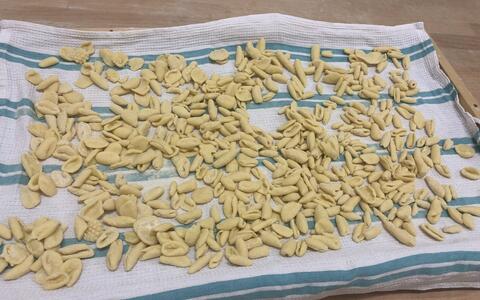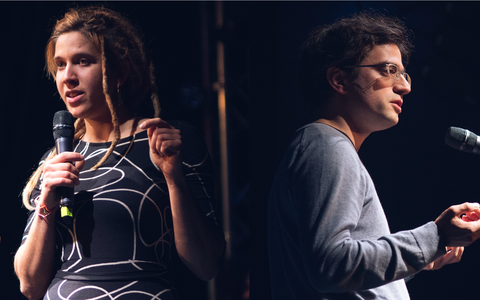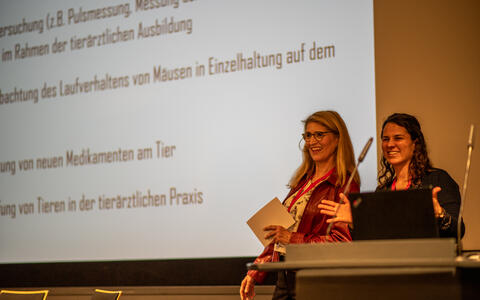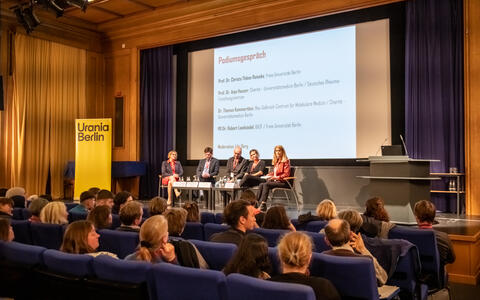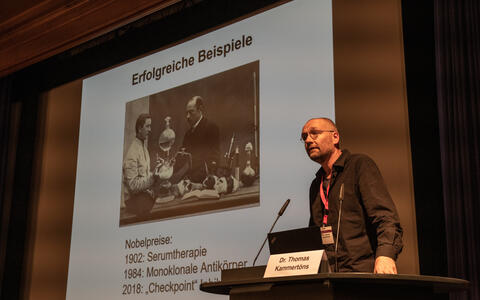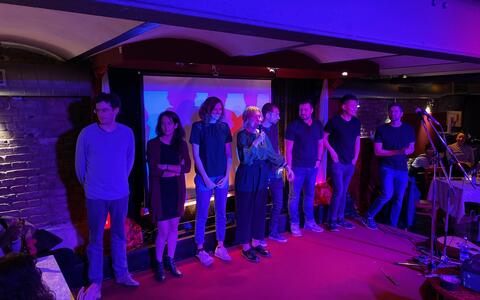Celebrating Science
Pasta and pesto for the microbiome
Around 40 participants at the MDC workshop "Cooking for Microbiomes", held during Berlin Science Week, enjoyed a symbiosis of science, cooking, and interesting exchanges at a candlelight dinner. First, Theda Bartolomaeus from Sofia Forslund's lab introduced the details of the human microbiome, a largely unknown world with billions of microorganisms whose metabolism influences humans far more than previously known. Take-home-message for the participants: fibre is extremely important, as is a balanced diet - and somehow the microbiome also has a lot to do with mental health. In order to describe their relationship more precisely, however, more basic research is needed.
In a second lecture, Akis Liokatis from the Pastamadre team explained digestion from a food-chemical point of view. The cooking artist Maria-Lucrezia Schiavarelli introduced the practice of preparing sourdough, fermented vegetables, southern Italian pasta and homemade pesto and thus introduced the culinary part of the evening. Her Italian passion for cooking - and the creativity of this process - was passed on to the participants. The memories of scientific details are thus combined with those of good southern Italian tomato sauce and the rolling out of pasta dough, of pesto made from radish leaves, and animated conversations during the meal. From microbiom to candlelight dinner - successful science communication.
Stefanie Mahler
The inner life of the microbiome was the focus of the "Cooking for Microbioms" event.
Eureka! Detours, dilemmas and delights of discovery
The spotlights are bright, making the audience in front of me appear as only a shadowy cluster of people. Stage-fright sends heat waves through my body, but the moment I start talking is also a moment of relief. Excitement takes over as I start describing a lonely moment in a dark room.
I’m at an opening event of the Berlin Science week, a 10-day international science festival connecting science communities with the public. This show is jointly organized by The Bear and MDC: Scientists go on stage and tell a personal story about their mishaps, mistakes, and moments of truth.
With my story “Dark Spots of Berlin”, I try to build a bridge between what it can feel like working in a dark room for fluorescent microscopy and dancing in a dark club in Berlin. As I approach the climax of my story’s conflict, I hear some melancholic cello tunes, played by musician Illay Chester. It is fitting so well with the plot! “Amazing,” I think to myself, only to find out later that the music was a sign for me to finish up! It didn’t really matter and even though I could have been more concise, the feedback of the audience was rewarding, as I felt that I could give them a glimpse of what it is like to be a scientist.
Time for storytelling at the Bear: Six scientists of the MDC shared their very personal stories about the detours, dilemmas and delights of discovery in the labory.
That’s the superpower of this event: showing that scientists are not some white-coated geniuses who discover new stuff all the time and never fail. Failure is a huge part of science, it teaches us how to improve. “Sometimes the only way out is moving forward,” Emma Harris tells us in her story “Scholarship in the Snow”. This sentiment mirrors the spirit of the evening, which can be found in all of the stories. Field work on a remote Croatian island is a central part of Inga Patarčić’s story “Bitter-sweet taste of Science”, it awakened her taste for travel and experiencing the world. And in ”A Moment of Clarity in the Fog of Biology”, Emanuel Wyler very elegantly explains how he researched whether ribosomes slide or jump while building proteins like alcohol dehydrogenase. “It’s an important protein which I will definitely need later on!,” he tells the audience.
That’s exactly how the evening ends: people getting drinks from the bar and discussing their favourites. All of this wouldn’t have been possible without show host and organizer Dyane Neiman, who helped us scientists shape our stories. In the end, that’s also what science is about. It’s about telling stories.
Andreas Ofenbauer
Why Everyone Should Care About Open Science
“This changes everything” exclaimed PhD student Anna Raysyan after learning that journal impact factors are manipulated by a private company for publishers who can afford to do so. This was one of those lightbulb moments that one always hopes to see in workshops. It also answered the question posed by the title of this particular workshop: Why Everyone Should Care About Open Science. Further debate was prompted by talks on sharing research data, communicating science, and creating Citizen Science projects. The participants were a mix of about twenty scientists and interested members of the public and the discussion soon turned to the challenges and responsibilities of communicating science to the public in an era of fake news and social media celebrities.
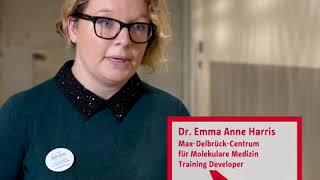
Many were excited by the idea of Citizen Science, where non-professional scientists actively contribute to scientific research, and several participants created action plans to become more involved in Citizen Science projects. One of our MDC scientists, Inga Patarčić, even pledged to find the funding to “develop a citizen science project that will improve understanding of the human genome”. The workshop was organised as part of the ORION Open Science Project by Luiza Bengtsson, Emma Harris, and Zoe Ingram from the MDC, and Maike Weißpflug from the Museum für Naturkunde; Zoe Ingram commented that “it is really exciting to see how enthusiastic the response was to the ideas of Open Science”.
Emma Harris
"What if there were no more animal testing?"
Why are animal experiments still being carried out even though there are alternative methods? How are the animals? And who do such experiments actually benefit? The public interest in these questions is great, but at the same time many myths are circulating. In this situation, first-hand information and open discussion at eye level is required. That's why the working group of the Berlin Animal Welfare Officers hosted a joint event together with major biomedical research institutions of the city for the first time during the Berlin Science Week. Around 250 interested citizens, including schoolchildren and teachers, accepted the invitation to the theme evening "Animal testing in conversation - absolutely necessary or long overdue?" at the Urania Berlin.
The lively discussion, in which MDC researcher Dr. Thomas Kammertöns was also involved, focused on alternative methods to animal experiments as well as questions regarding lab animal husbandry. In response to a visitor's question "What happens when an animal experiment is approved - is it carte blanche then?", the experts on the podium described the strictly regulated and meticulously documented procedure, in which each individual animal must be recorded. "And what would happen if no more animal experiments were to be carried out – starting tomorrow?" another guest wanted to know. Then there would be no more new drugs or chemical substances, the experts said, because animal experiments are required by law and are still very useful. After the official end of the meeting the discussion continued, with pretzels and beer, at the various info points set up by the Berlin Animal Welfare Officers.
"Mind the Lab" - putting science literally in the way of the public
Everyone knows the famous "Mind the Gap!” warning announcement from the London subway. For a couple of hours on Thursday, 7 November, passengers who took public transport in Berlin could hear a slightly different call: “Mind the lab!”. Stepping out of their comfort zone – their labs, scientific conferences, and workshops – researchers from Max Delbrück Center for Molecular Medicine (MDC) brought their laboratories to the underground to show hundreds of BVG passengers their work.
What do fruit smoothies and single-cell sequencing have in common? That was the first question asked by those who stopped at the MDC and LifeTime stand in Alexanderplatz U-Bahn station. There were apples, bananas, grapes, plums, and lemons on display. While mixing them together with a smoothie maker, scientists explained what single-cell sequencing is: the ability to study single cells in great detail, identify each one and their role in our body. But while it might be difficult to reconstruct which fruits we put in a smoothie in the morning without knowing the recipe, scientists can now easily tell apart single cells in a “cell soup”.
"Make science simple" - the motto at the MDC booth in the subway station "Alexanderplatz".
Also on show were artificial organoids, prepared especially for this event. In the lab, those tiny, self-organised three-dimensional tissue cultures are altering how scientists study, recognize and treat diseases. Both organoids and single cell sequencing are key technologies for the pan-European project called LifeTime.
Valentin Popescu
Science Slam of a LifeTime
The stage has red curtains, a few blue-coloured light spots, a podium, and a couple of microphones. The audience sits at the tables enjoying a glass of wine or beer. It resembles a location suitable for stand-up comedy. But during the Berlin Science Week, MDC researchers took to the stage in the theatre-club Umspannwerk Ost to do their own show of stand-up science. Six brave young scientists joined the "I know something that you don't know" game show, a science slam for those thirsty of knowledge, organized by the MDC and the LifeTime Initiative.
Emanuel Wyler brought his herpes virus mascot to the stage to explain single-cell sequencing. Angélica García Pérez demonstrated her work with organoids and their applications with the help of the famous Transformers (the science fiction movies characters that have the ability to transform themselves from cars to robots and vice versa), while Rieke Kempfer used GIFs to present her studies on DNA folding. Marco Urig presented micropeptides, the smallest proteins, recently discovered. Jorge Martins showed the public how organoids are transforming the way scientists study diseases, and Bo Hu talked about the role of cells in health and disease.
Scientists of the MDC at the “I know something you don’t know” event.
Each presentation illustrated one of the core technologies of the LifeTime initiative: single-cell sequencing, artificial intelligence, and organoids. At the end of the show, the public decided that the winner of the science slam was Angélica García Pérez. The audience were impressed by her presentation focused on the future application of organoids in finding treatments for diseases such as amyotrophic lateral sclerosis or spinal muscular atrophy.
Valentin Popescu
Who wants to know better? A show for critical thinkers
Real or Fake? Heads are put together, people whisper, or at least they try – some of the discussions are rather passionate. More than ten teams have to decide, each on their own, which of the science stories told on stage of the Lilienthal Gymnasium are true, and which ones are not. School students are encouraged to think critically and identify fake news, while they learn about science and also get to know the personalities behind it.
Student and teachers of the Lilienthal school at the „Real or fake“ event.
For this unique show at the Berlin Science Week, Svenja Steinfelder, Emanuel Wyler and Andreas Ofenbauer from the MDC joined forces with Ute Weckman (GFZ Potsdam) and Karla Hajman aka “Miss Stereochemistry” (former neuroscientist, now freelance artist and musician) for an amazingly entertaining afternoon full of science talks and music. For the organizers from BesserWissen, Luiza Bengtsson and Tamara Worzewski, it was a premiere of their “Real or Fake” format in a school. The young adults were very attentive and some even were thinking about becoming scientists themselves. “You brought the usually quite distant and hard to imagine science to school and made it tangible. Thank you!,” one of the teachers told us at the end. We repaid the compliment by praising the student’s capacity of critical thinking. Many student teams even scored better than the teacher’s team in distinguishing real from fake science stories.
Andreas Ofenbauer
Further information
Press release: Cooking, storytelling, and experimenting: The MDC at Berlin Science Week

